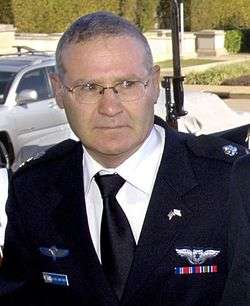Amos Yadlin
| Amos Yadlin | |
|---|---|
|
Amos Yadlin as attaché to Washington | |
| Native name | עמוס ידלין |
| Born |
1951 Hatzerim, Israel |
| Allegiance | Israel |
| Service/branch | Military Intelligence Directorate |
| Years of service | 1970–2010 |
| Rank | Aluf (Major General) |
| Commands held | Air Intelligence Directorate, Chief of Staff of the Israeli Air Force |
| Battles/wars | Yom Kippur War, Operation Opera, First Lebanon War, Second Lebanon War |
| Relations | Aharon Yadlin (son), |
Aluf (Major General, res.) Amos Yadlin (Hebrew: עמוס ידלין; born 20 November 1951) is a former Israeli Air Force (IAF) general, Israel Defense Forces military attaché to Washington, D.C. and head of the IDF Military Intelligence Directorate (Aman).
Biography
Amos Yadlin was born in Kibbutz Hatzerim, the son of Edah and Aharon Yadlin. In 1970, he enlisted in the IAF. Yadlin obtained a B.A. in Economics and Business Administration at Ben Gurion University in the Negev. He received a master's degree in Public Administration from the JFK School of Government, Harvard University.[1]
Military career
After qualifying as a fighter pilot, Yadlin joined the 102 "Flying Tiger" Squadron, with which he flew the A-4 Skyhawk during the Yom Kippur War. In the early 1980s Yadlin was among the first batch of Israeli pilots to fly the F-16 Fighting Falcon and was among the eight pilots selected to carry out Operation Opera against Iraq's Osirak nuclear reactor in June 1981. A year later, Yadlin participated in Operation Peace for Galilee. In all he had accumulated about 5,000 flight hours and flew more than 250 combat missions. Yadlin commanded two fighter squadrons (116 and 106), two Israeli Air Force bases (Nevatim and Hatzerim) and between 1990 and 1993 headed the IAF's planning department. He then served as Deputy Commander of the IAF.
In February 2002 Yadlin was awarded the rank of Major General and appointed commander of the IDF's Military Colleges and National Defence College. Between 2004 and 2006 he served as Israel's military attaché to the United States. Upon his return to Israel, Yadlin was named head of Aman, the IDF's Military Intelligence Directorate.[2][3]
Post-retirement
After his retirement from the IDF in November 2010, Yadlin joined the Washington Institute for Near East Policy as the Kay Fellow on Israeli national security. In November 2011, he was appointed director of Tel Aviv University's Institute for National Security Studies.[2]
Yadlin's public positions have urged caution and patience in dealing with the nuclear program of Iran, in contrast to the more urgent language of Prime Minister Benjamin Netanyahu.[4] He tentatively supported the Geneva interim agreement of November 2013.[5]
Yadlin advocates, if peace negotiations with the Palestinians fail to produce an agreement, unilaterally withdrawing from 85% of the West Bank. The IDF would maintain a presence in the Jordan Rift Valley and in the main settlement blocs, as well as a strip of land meant to protect Ben Gurion Airport from Palestinian rocket attacks.[6]
In January 2015, he joined the Zionist Union list for the elections for the twentieth Knesset, as its candidate for Ministry of Defense.[7]
Published works
- Yadlin, Amos (2004). "Ethical Dilemmas in Fighting Terrorism". Jerusalem center for public affairs. Archived from the original on June 8, 2011. Retrieved June 19, 2011.
References
- ↑ The International Security Forum - Speakers (page 4)
- 1 2 "Maj. Gen. (ret.) Amos Yadlin". Tel Aviv, Israel: Institute for National Security Studies. November 2011. Retrieved December 23, 2011.
- ↑ Harari, Yael; Shoham, Yuval (February 27, 2011). שירות עמוס (in Hebrew). Israeli Air Force Magazine. Retrieved December 23, 2011.
- ↑ Birnbaum, Ben (23 October 2013). "Amos Yadlin on Iran Strike: Why Israel Needs to Act Soon". The New Republic. Retrieved 17 December 2013.
- ↑ Cohen, Gili (24 November 2013). "Former army intel chief: Iran deal better than alternative - no deal". Haaretz. Retrieved 17 December 2013.
- ↑ Gili Cohen (28 January 2014). "Top Israeli think tank: If talks fail, Israel should withdraw from 85% of West Bank". Haaretz. Retrieved 29 January 2014.
- ↑ "Former IDF intel chief joins Zionist Camp; Mofaz doesn't". Haaretz. 19 January 2015.
